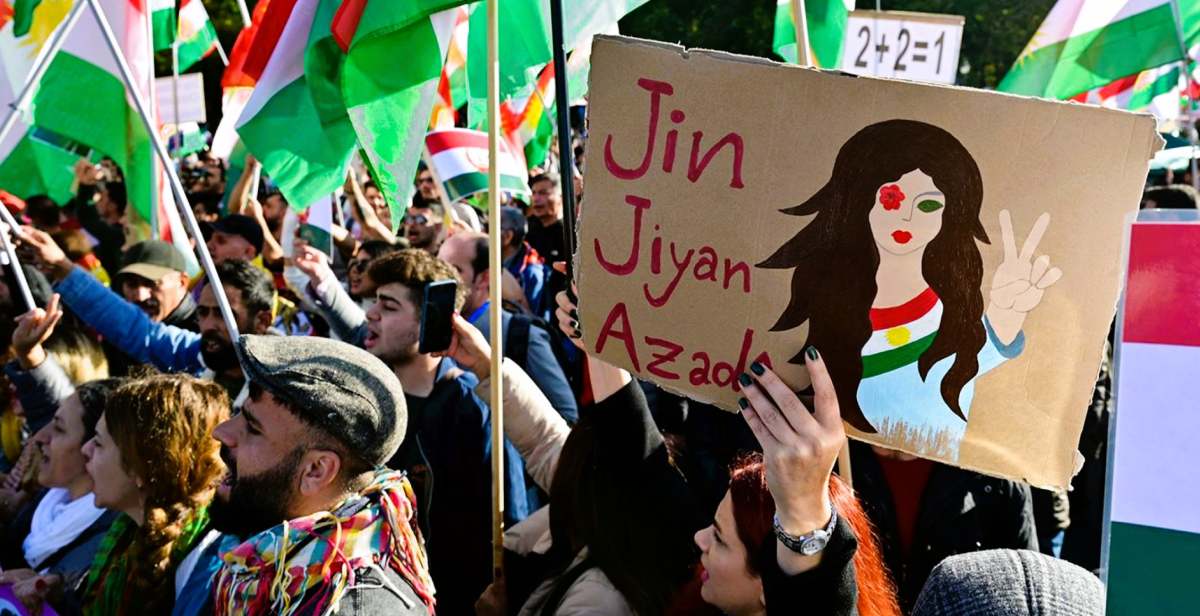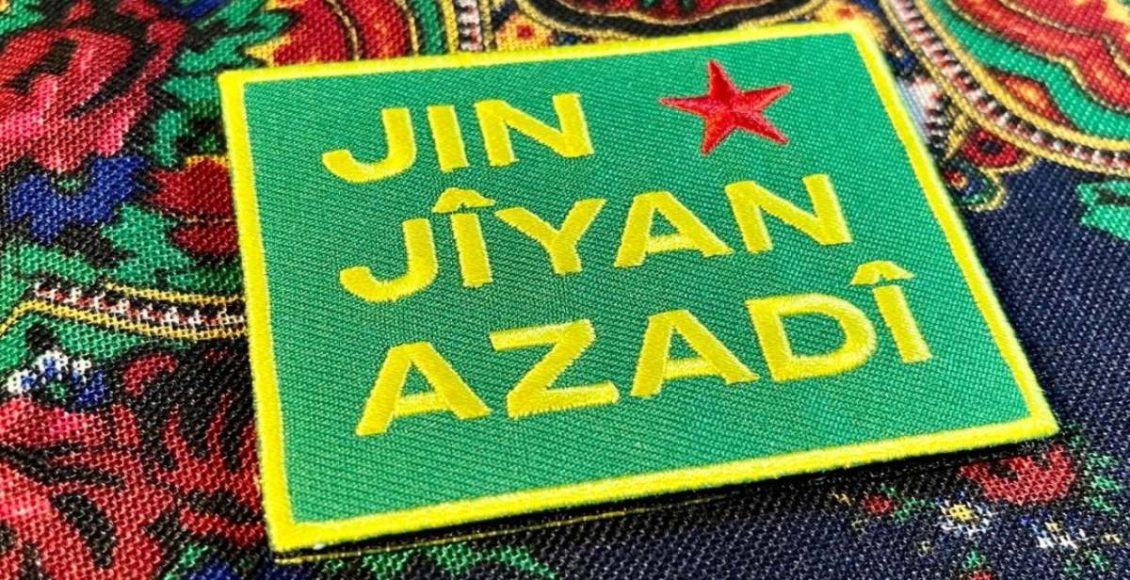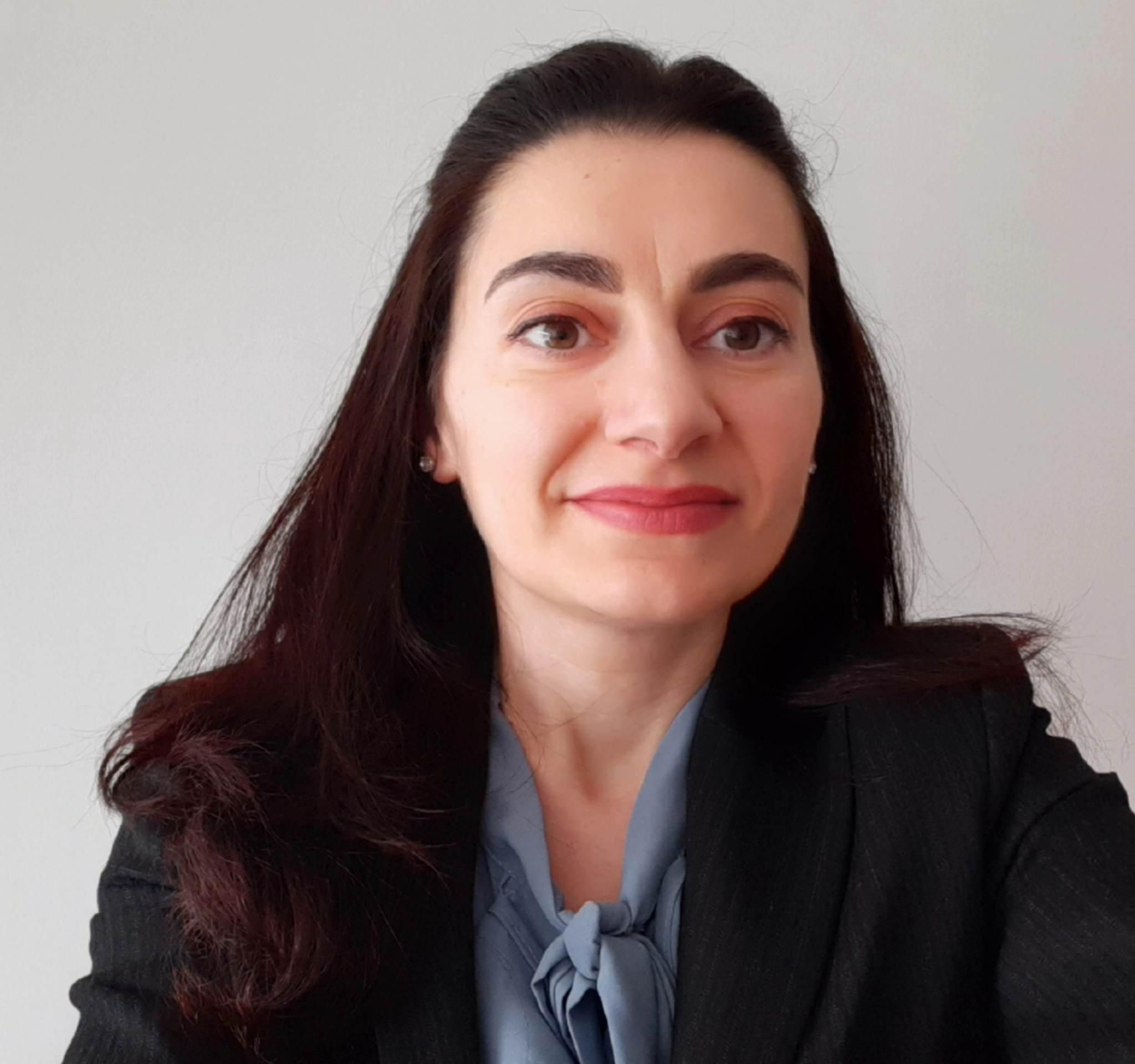The death of the Kurdish woman Jina Amini in September 2022 sparked an inferno of protests throughout Iran, under the banner of “Jin, Jiyan, Azadi.” This Kurdish language slogan, which translates to “Women, Life, Freedom,” soon showed up on banners carried throughout the cities of Eastern Kurdistan (northwest Iran), and quickly became the official slogan of what many deemed a new “Iranian Revolution.” It was not long until “Jin, Jiyan, Azadi” was projected onto the Brandenburg Gate in Berlin, chanted at the Cannes Film Festival, and shouted by Western women politicians in European Parliaments. Women all across social media even began cutting pieces of their hair before reciting the phrase into their web cameras.
Historical and Ideological Roots
But the reality is that Jin, Jiyan, Azadi was not a recent phrase spawned from Jina Amini’s death but a declaration going back decades, emanating from the Zagros Mountains of Kurdistan, and the women resistance fighters who first used it. These Kurdish women were not helpless victims beaten by so-called ‘morality police’, but rather armed guerrillas, who have utilized the phrase of Jin, Jiyan, Azadi to explain their wider philosophy of women’s liberation, their study of Jineology (women’s science), and their political ideology of Democratic Confederalism.
Underpinning this slogan was also a philosophy of the Kurdistan Communities Union (KCK), which says: all positions of authority should have equal ‘Co-Chairs’ of one man and one woman; women should be organized into self-defense militias to protect themselves; and women should have their own civic groups to ensure their interests. In the process, these Kurdish women were not just outlining a blueprint to free the Kurds but all of humanity, with them displaying how to dismantle society’s political ‘glass ceiling.’
Historically, the dynamic of Kurdish women resisting for their lives and freedom has a rich legacy across all four parts of Greater Kurdistan. From Leyla Qasim being hanged for standing up to the dictator Saddam Hussein, to Leyla Zana spending years in prison for demanding Kurds be allowed to speak their own language in Turkey – we can see the planted seeds which sprouted into the Jin, Jiyan, Azadi flowers.
More recently, this defiance of Kurdish women for life and freedom has included artist Zehra Dogan – who was imprisoned for painting the destruction of the city of Cizre by the Turkish military, musician Nudem Durak – who is imprisoned in Turkey for singing in the Kurdish language, and teacher Zara Mohammadi – who was imprisoned by Iran for giving Kurdish lessons to children. In all such cases, what you see is that Kurdish women are targeted and punished for resisting, whether it be picking up a paintbrush, singing a melody, or pronouncing a word in their mother tongue.
Culture of Defiance
Some of this unique spirit of freedom amongst Kurdish women is reflected in the culture, where you have many myths, folk songs, and ballads celebrating or venerating women. In these stories and songs, the women resist an unwanted marriage or defy the dictates of a man trying to control them and instead go off and elope with the man of their choice.
One thinks of the Kurdish proverb: “A lion is a lion, whether male or female.”
Within Kurdish religious communities amongst various faiths, women also serve important roles, for instance, amongst the spiritual practices of Alevi Kurds (Reya Heqi), where sacred femininity has a central importance and is seen as the protector of life. You also have a growing list of Kurdish women poets who are pushing boundaries by addressing taboo issues of sexuality and womanhood in a way that is inspiring other Middle Eastern communities of women to do the same.
In the artistic world, Kurdish women are also using art as a powerful tool to represent what it means to be a Kurd, a woman, and a human being. This suppression of Kurdish voices by occupying states has meant that Kurdish women, in particular, have had a lot to say when finally given the chance. Many times, the message motivating these works is preserving a denied history or critiquing structures that are limiting Kurdish women’s freedom.
Outside of the cultural front, Kurdish women have also been on the front lines in civic and political life, in particular over the last few decades. This has seen Kurdish women be elected mayors all across Northern Kurdistan, and many of them defy the central Turkish state and be imprisoned when it comes to defending Kurdish civil rights. Unfortunately, many Kurdish women are first mentioned in the Western media when they are either arrested or killed for defending their freedoms, showing that Jin, Jiyan, Azadi is not a suggestion but an ethos that they live by and place their lives on the line to achieve. In this way, the name Jina Amini joined the list of assassinated Kurdish women political martyrs, spanning from Sakine Cansız to Hevrin Khalaf and Nagihan Akarsel.
But the common denominator in all of these situations is Kurdish women refusing to accept the limited space that a patriarchal world and a traditionally conservative society have set out for them. This is what prepares Kurdish women to stare down dictators, death squads, riot police, and intelligence agencies trying to murder them, as these dominant masculine institutions are continuations of the same battles they are used to fighting on the literal home front in their living rooms. Even in the 18th and 19th centuries, many Western orientalist anthropologists frequently wrote about this spirit because they were enamored with how Kurdish women appeared to be “freer” than their expectations and the other cultures around them.

Resisting Instead of Protesting
It is impossible to speak about the role that Kurdish women have played in advocating for life and freedom throughout Kurdistan without recognizing the unique aspect that women have been fighting alongside men for many years in an array of Kurdish parties. From the Komala (Komala Party of Iranian Kurdistan), PDKI (Democratic Party of Iranian Kurdistan), PJAK (Kurdistan Free Life Party), and PAK (Kurdistan Freedom Party) in Eastern Kurdistan / Iran; to the women Peshmerga of the PUK (Patriotic Union of Kurdistan) in Southern Kurdistan / Iraq, to the women guerrillas of the PKK (Kurdistan Workers’ Party) in Northern Kurdistan / Turkey, and to the women fighters of the YPJ (Women’s Defense Units) in Rojava / Syria.
In each of these instances, Kurdish women challenged stereotypes in a traditionally male-dominated and conservative society and eventually won the support of many Kurdish men through their heroism. This is particularly exceptional when you consider that in many Western nations women still do not fight side-by-side with their male counterparts, showing that on this particular issue Kurdish women are leading the way in breaking barriers. It should also be said that Kurdish women resistance fighters are much more than photogenic and ‘exotic’ rarities, and they stem from a long line of Kurdish women who have been resisting gender norms and patriarchal attempts to limit their horizons for centuries.
The Limited Nature of Azadi
In the latter case of the YPJ, they stand out for also being celebrated by the Western media for their armed resistance against ISIS from 2014 to 2019. This saw YPJ women being hosted at the French Presidential Palace and on the covers of fashion magazines, while endless documentaries, feature films, and books were written in the West about how unique it was to see unveiled young women in the Middle East battling men who wanted to place them in literal chains.
This allowed the Kurdish women of the YPJ to stand as avenging angels in the ultimate “good versus evil” battle that news coverage in the West prefers. However, when those same YPJ women have been targeted by Turkish airstrikes, the same Western press mostly ignores the story and moral imperative so as not to alienate their strategic NATO ally. Which calls into question how much they realize the universality of the message, which literally declares that Women have the right to defend their Life and seek Freedom against all who threaten them.
The slogan also does not place limitations on how women gain or preserve their life and freedom, as seemingly these are inalienable absolute human rights, meaning they are justified in using defensive armed resistance if necessary to secure them. This fact seemed obvious in Washington, Brussels, and London when the YPJ were defending themselves against ISIS terrorists, but less so when that foe has the ability to control access to the Black Sea as Ankara does.
Unfortunately, in such cases, the current political landscape shows that the heroism of Kurdish women will be celebrated when it aligns with the foreign policy objectives of the states in question and ignored or even outlawed when it goes against those objectives. This is how you get an illogical situation where YPJ can be heroines when staring down an ISIS tank, but victims who are not worth mentioning when looking up at a Turkish drone. Which brings up another uncomfortable reality for Western politicians: the fact that this particular slogan of Jin, Jiyan, Azadi was popularized by the Kurdish leader Abdullah Ocalan, who has been imprisoned by Turkey on an isolated island for the past 24 years.
And while it is hard to find many democratic governments who theoretically object to the principle of women’s equality, “freedom” in particular is open to interpretation. Does it mean they have the freedom to speak their own language? Or establish their own autonomy or independent state of Kurdistan? It seems that in the Kurds’ case, freedoms are recognized as legitimate by Western powers for the Kurdish women in Iran, Syria, and Iraq (geopolitical foes), but less so in Turkey.
More than Words on a Banner
Jin, Jiyan, Azadi is now officially part of the political vocabulary around the world. It has been shouted from the mouths of thousands, if not millions, of women worldwide, meaning that it cannot easily be forgotten. But supporters of this message must demand that the words behind the declaration are further understood and insist that the Kurdish women who gave the world this declaration are themselves not overlooked or removed from the message. States have a tendency to take radical ideas and then sanitize them to the point that they become safe and non-threatening to their own power.
In this way, there have been and will be more attempts to make Jin, Jiyan, Azadi a cliché or message on a bumper sticker, a phrase that everyone can recite but very few can explain. Over time, it is likely that the Kurdish phrase itself will fully morph into the English-translated phrase, to the point that the linguistic origins will be forgotten. Even in Iran, the Farsi variation “Zan, Zendegi, Âzâdi” began to show up soon after, and other conflicts around the world also began to translate the slogan into their own native languages.
The Kurdish movement that coined the phrase did not object, as the entire point of Jin, Jiyan, Azadi is to make it a universal message in every language of the world. But one would hope that, out of gratitude, those borrowing the message would at least acknowledge its original source and the decades of struggles, pain, and imprisonment that it cost to formulate the equation. Many Kurdish women gave up their lives and freedom in order for women now all around the world to be able to call for it. Plus, the slogan should not be the final step, but the first move in asking deeper questions and learning more about the wider philosophy behind the words. As once you call for a full life and true freedom for all women, it is necessary to explain how to bring that about and how to protect it once created.
Endnote: This article was presented at the Annual International Conference on the EU, Turkey, the Middle East and the Kurds, which was hosted by the EU Turkey Civic Commission (EUTCC) in Brussels on December 6-7, 2023.




Comments are closed.